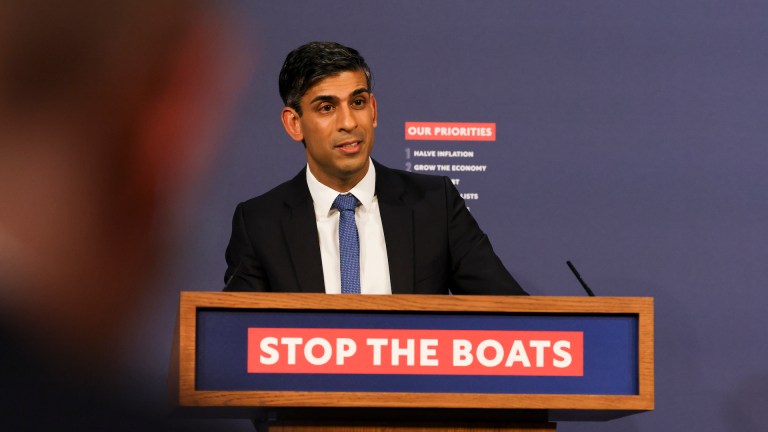If much of this sounds familiar, it’s because it is. Most of these measures were rejected by the House of Lords, when the government tried to pass them as part of its Police, Crime, Sentencing and Courts Bill.
The new plans have already been met with dismay and anger by campaigners, with Liberty saying: “These rehashed measures to crack down on protest in today’s Queen’s Speech are yet another power grab from a government determined to shut down accountability.”
Energy Bill
A new Energy Bill comes just a month after the government released its Energy Security Strategy, which outlined how the UK will move away from dependence on imported fossil fuels towards “secure, clean and affordable British energy for the long term”.
The strategy was heavy on nuclear and offshore wind, but was criticised for being light on onshore wind, pledging more oil and gas exploration, and failing to include measures for helping households with soaring energy costs in the short-term.
Campaigners may be disappointed once again, with Jess Ralston, analyst at the Energy and Climate Intelligence Unit (ECIU) suggesting that the bill will contain “little” on the issue of insulation and high energy costs in the short term, with the potential introduction of minimum energy efficiency standards for homes likely to be a longer-term goal.
The bill may include an extension of the current energy price cap, which determines how much energy suppliers are allowed to charge customers. The government may also allow the price cap to be updated more frequently.
This is the measure most likely to hit headlines, as it will affect how much energy bills will be rising, falling or staying the same for ordinary households in the coming months.
Reports so far suggest that the bulk of the bill will include technical measures around energy infrastructure, supply and financing. According to reports in the Financial Times, the following policies are anticipated:
- Introduction of a “future system operator” which would sit at the heart of the UK’s electricity and gas infrastructure, managing energy supply, demand and planning, and helping the UK prepare for net zero. This would effectively re-nationalise key responsibilities that have been carried out by the privatised National Grid.
- Introduction of a new financing model to scale up production of low-carbon hydrogen gas for industries like steel and chemical manufacturers.
- Introduction of a new financing model for the rollout of carbon capture technology, which government ministers hope can allow the UK to keep using gas-fired power stations to cut emissions from big industrial centres in the country. This financing model could include a surcharge added to energy bills.
Private Renters Bill
Prince Charles also detailed the government’s long-awaited reform of the rental sector, promising a bill “to strengthen the rights of tenants”.
The Renters’ Reform Bill has been in the works for three years since Theresa May promised to axe section 21 evictions – also known as ‘no-fault’ evictions as they allow a landlord to evict a tenant without giving a reason. The evictions have been described as a leading driver of homelessness and last month Shelter warned renters are receiving a notice every seven minutes.
The private rental sector reforms also look to improve standards in rented accommodation with a Decent Homes Standard and will explore the introduction of a national landlord register.
Campaigners have been calling on the government to act to protect renters ever since May’s promise in April 2019. Last week the Renters’ Reform Coalition – a 20-strong group of charities, renter pressure groups and unions including Shelter, Generation Rent and ACORN – delivered a letter to Downing Street warning ministers that they must act urgently.
The letter read: “With the rising cost of living, additional pressure is being placed on renters of all ages and backgrounds. Rapidly rising rents are squeezing household budgets and pushing ordinary people further from the dream of home ownership. The end of Coronavirus Act protections means that, until section 21 is repealed, renting families live in fear that requests for repairs could be met with an eviction that uproots their lives and adds further financial strain.”
Alicia Kennedy, director of Generation Rent, said: “Renters have been waiting three years for the government to abolish these insidious Section 21 evictions. Finally, legislation looks to be on its way.
“But we can’t rest until the changes are passed into law. Now it’s the details that matter.
“It is essential that any new tenancy regime reduces the number of unwanted moves and gives renters the confidence to challenge poor practice by landlords.”
Bill of Rights
A Bill of Rights has been announced to “restore the balance of power between the legislature and the courts.”
It is not clear whether this will replace the Human Rights Act, passed by the Labour government in 1998, or work alongside it, but the legislation could pit UK law against EU law. The bill could give UK judges more freedom to diverge from European court of human rights rulings.
A Tory manifesto commitment to “update the Human Rights Act and administrative law to ensure that there is a proper balance between the rights of individuals, our vital national security and effective government”.
But more than 50 human rights charities including Amnesty UK have warned that tearing up the Human Rights Act would have dire consequences. The act contains obligations to properly address violence against women and girls, and was instrumental in winning compensation for two victims of London black-cab driver John Worboys, after it was ruled that the Met Police failed in its duty to properly investigate the serial sex attacker.
“Scrapping the Human Rights Act poses a real, imminent threat to rights in the UK” said Martha Spurrier, director of human rights charity Liberty.
“It’s a blatant, unashamed power grab from a government that wants to put those in power above the law. They are quite literally rewriting the rules in their favour so they become untouchable.
“The Human Rights Act has empowered people in the UK to enforce their rights in practice. It has enabled people to challenge unlawful policies, be treated with dignity by public authorities and secure justice for their loved ones. It has changed the way that we are treated in schools, hospitals and care homes, improving everyday life for people across the country.
“The government’s plan is to weaken and undermine this, taking power away from the public to take for themselves. We all know this government cannot be trusted to keep its word or play by the rules. We’re urging everyone to not let them get away with this looting of our rights. Speak up and make your voice heard.”
Schools Bill
A new Schools Bill forms a core part of the government’s levelling up agenda, with the stated aim of making sure 90 per cent of children leaving primary school have achieved expected standards in reading, writing and maths.
Details announced ahead of the speech included a focus on turning more schools into academies, cracking down on attendance, giving regulator Ofsted more powers and giving more support to families who home school their children.
Boris Johnson said: “We are determined to raise standards in our schools so every child has access to the same opportunities wherever they live, and our brilliant teachers are supported to do what they do best, which is why we’re putting our education ambition into law this week.
Social Housing Regulation Bill
The Social Housing Regulation Bill was detailed in the Queen’s Speech as part of the government’s priority to “ensure better quality and safer homes”
The state of social housing has been under the spotlight in recent years following the Grenfell disaster in 2017.
That scrutiny has intensified in the last year as an enquiry into the blaze has continued to uncover failures while an investigation from ITV News and activist Kwajo Tweneboa’s campaigning has continued to highlight horror homes across the country.
The bill – which follows the government’s social housing white paper published in November 2020 – aims to boost powers open to regulators the Regulator of Social Housing and the Housing Ombudsman to deal with complaints and boost standards across the board.
The legislation sets out measures to ensure social housing is safe, ensure swift and effective complaint resolution as well as strengthening the consumer standards social landlords must meet and creating “a strong, proactive regime” to enforce them.
Residents will also be able to engage with and hold landlords to account under the plans.
Grenfell United, a group of survivors and bereaved families affected by the 2017 fire, said the bill is a “small step forward, but there’s a long road ahead”.
A spokesperson for the group told The Big Issue: “It’s taken the government five years to publish the Social Housing Regulation Bill. Seventy-two people died because of a rogue landlord, hundreds of thousands of people are still forced to suffer in squalor – this news is long overdue.
“We hope this is the first step towards meaningful change the sector so desperately needs. That it paves the way for a more effective complaints system for residents, robust independent inspections and professionalisation of the housing sector.
“This is a small step forward, but there’s a long road ahead. The Social Housing Regulation Bill must be read in parliament and the department for Levelling Up, Housing and Communities must commit to the full set of changes promised in the Social Housing White Paper. We cannot allow homes to kill again.”
What was left out?
Employment Bill
As feared, a long-awaited Employment Bill was not included in the speech. First promised in 2019, the bill was hoped to bring together a range of policies that would improve workers’ rights and boost incomes for millions of people.
“The prime minister promised to make Britain the best place in the world to work. But he has turned his back on working people. No employment bill means vital rights that ministers had promised – like default flexible working, fair tips and protection from pregnancy discrimination – risk being ditched for good,” O’Grady continued.
Climate and Ecology Bill
Tabled as a private member’s bill by Green MP Caroline Lucas, the Climate and Ecology Bill looked to impose duties on the UK to meet climate and nature targets, with the creation of a Climate and Nature Assembly to advise the secretary of state on strategies for achieving them.
The bill had drawn wide support from campaigners, organisations and businesses including Oxfam, Co-Op and the Wildlife Trusts. It reached a second reading in the last parliamentary session, but was not mentioned in the Queen’s Speech, indicating that it may be dropped.









